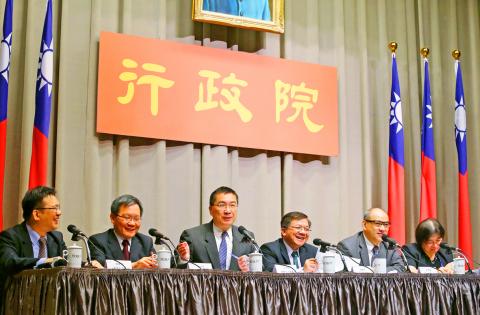The Cabinet yesterday approved a draft bill relaxing the restrictions on foreign white-collar workers in a bid to attract skilled foreigners for the government’s “Asian Silicon Valley” initiative.
The draft bill would relax the regulatory constraints on residence and work permits, taxation, internships, healthcare and retirement benefits.
The bill is aimed at attracting three categories of workers: general specialists, including freelance workers, artists and teachers; specialists of designated fields, including science, economics, education, culture, sports and others; and senior specialists, including highly skilled professionals, university professors, Olympic medalists and coaches of national sports teams.

Photo: CNA
An “employment gold card” — a four-in-one residence and work permit that consists of a resident visa, an alien resident certificate, a re-entry permit and a work permit that allows foreign workers to transition between jobs without their employer’s consent — would be given to foreign specialists.
The act would also extend the residency period for foreign employees from three to five years and scrap a regulation requiring workers with permanent residency to stay in Taiwan for at least 183 days every year.
A one-year resident visa would be offered to the family members of foreign workers, while children of holders of an alien permanent resident certificate would be allowed to work in Taiwan.
The spouse and children of foreign workers with an alien permanent resident certificate would also be able to apply for the certificate.
Workers with an alien permanent resident certificate would also be eligible to receive monthly pension payments. The spouse and underage children of a foreign worker would be allowed join the National Health Insurance (NHI) program without having to wait for six months.
Specialists of designated fields with an annual salary of more than NT$2 million (US$65,772) would be eligible for a three-year 50 percent tax exemption on their wages.
Visa regulations would be relaxed for students and college graduates seeking internship in Taiwan.
Foreigners seeking to work in Taiwan under the act must either have work experiences with a monthly salary of more than NT$47,971 or have a degree from one of the world’s top 500 universities.
“The key to pushing ahead with the ‘Asian Silicon Valley’ project is to attract top foreign talent and build a creative environment for Taiwanese,” Premier Lin Chuan (林全) said.
In a bid to build an ecosystem for technology start-ups, the National Development Council, in addition to preparing the draft act, has a budget of NT$100 billion to help Taiwanese industries transition to Internet of Things technologies, augmented and virtual reality technologies, artificial intelligence, self-driving car technologies and medical care.

The US government has signed defense cooperation agreements with Japan and the Philippines to boost the deterrence capabilities of countries in the first island chain, a report by the National Security Bureau (NSB) showed. The main countries on the first island chain include the two nations and Taiwan. The bureau is to present the report at a meeting of the legislature’s Foreign Affairs and National Defense Committee tomorrow. The US military has deployed Typhon missile systems to Japan’s Yamaguchi Prefecture and Zambales province in the Philippines during their joint military exercises. It has also installed NMESIS anti-ship systems in Japan’s Okinawa

‘WIN-WIN’: The Philippines, and central and eastern European countries are important potential drone cooperation partners, Minister of Foreign Affairs Lin Chia-lung said Minister of Foreign Affairs Lin Chia-lung (林佳龍) in an interview published yesterday confirmed that there are joint ventures between Taiwan and Poland in the drone industry. Lin made the remark in an exclusive interview with the Chinese-language Liberty Times (the Taipei Times’ sister paper). The government-backed Taiwan Excellence Drone International Business Opportunities Alliance and the Polish Chamber of Unmanned Systems on Wednesday last week signed a memorandum of understanding in Poland to develop a “non-China” supply chain for drones and work together on key technologies. Asked if Taiwan prioritized Poland among central and eastern European countries in drone collaboration, Lin

Renewed border fighting between Thailand and Cambodia showed no signs of abating yesterday, leaving hundreds of thousands of displaced people in both countries living in strained conditions as more flooded into temporary shelters. Reporters on the Thai side of the border heard sounds of outgoing, indirect fire yesterday. About 400,000 people have been evacuated from affected areas in Thailand and about 700 schools closed while fighting was ongoing in four border provinces, said Thai Rear Admiral Surasant Kongsiri, a spokesman for the military. Cambodia evacuated more than 127,000 villagers and closed hundreds of schools, the Thai Ministry of Defense said. Thailand’s military announced that

CABINET APPROVAL: People seeking assisted reproduction must be assessed to determine whether they would be adequate parents, the planned changes say Proposed amendments to the Assisted Reproduction Act (人工生殖法) advanced yesterday by the Executive Yuan would grant married lesbian couples and single women access to legal assisted reproductive services. The proposed revisions are “based on the fundamental principle of respecting women’s reproductive autonomy,” Cabinet spokesperson Michelle Lee (李慧芝) quoted Vice Premier Cheng Li-chiun (鄭麗君), who presided over a Cabinet meeting earlier yesterday, as saying at the briefing. The draft amendment would be submitted to the legislature for review. The Ministry of Health and Welfare, which proposed the amendments, said that experts on children’s rights, gender equality, law and medicine attended cross-disciplinary meetings, adding that